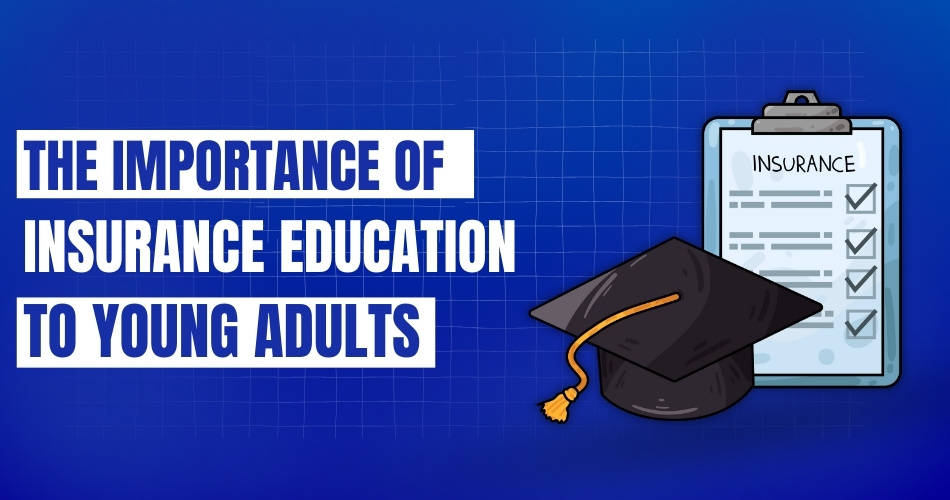Insurance might be one of the driest topics for young adults or any person for that matter, but it is still one crucial part of their financial literacy status upon crossing into a threshold of responsibility. When you find yourself transitioning from the safe haven and protective arms of your parental faucet into making decisions on your own, the knowledge of insurance becomes very important.
For health, auto, life, or renter’s insurance, the right knowledge is all about protecting from the unknown and keeping the potential financial blows at bay. Insurance is not just about safeguarding assets; insurance is about securing the future. Still, a lot of young adults find insurance illogical or even overwhelming, so they end up underinsured and sometimes not insured whatsoever.
Now, this is where insurance education will be channeled towards young adults. It will equip them with the basics concerning insurance and power them up so that they can make the correct choices that will eliminate any doubt and discover a way to financial security.
Knowing the Basics: What Is Insurance?
In simple meaning, insurance is a financial contract that safeguards one from potential future loss. It is based on the idea of pooling risks, that policyholders pay premiums into a pool which is then used to cover the losses of the few who actually experience an occurrence of the insured events. That sounds quite easy, though: the various insurances, each with their own terms, conditions, and details of coverage, turn out to be quite complicated. For example, health insurance should cover your medical bills; yet, the fine print, such as deductibles, co-pays, and out-of-pocket maximums, can vary a whole lot from one policy to the next. For another instance, car insurance is meant to guard against damages connected with cars, but you need to understand liability versus comprehensive if you are to be sure that you are fully protected.
Why Insurance Is Important for Young Adults
Most young adults try to convince themselves that they do not need insurance, especially when they are healthy and beginning their careers. This, however, is a rationale that may bring with it serious financial catastrophes. For instance, one accident or illness without taking health insurance may result in medical bills that will take years to settle after the incident. It’s just as disastrous not having auto insurance when that accident hits. Even renter’s insurance, which many young adults forget to carry, has its significance: it’s that which will protect your belongings against, for example, theft, fire, and other damages. The insurance gives you a safety net in place so that one catastrophe doesn’t basically unravel all your work.
Types of Insurance Common for Young Adults
Health Insurance: The most crucial insurance is that which deals with medical expenses. One has to have some type of coverage, whether it is through an employer or a parent’s plan, to avoid bizarrely high costs through health care.
Auto Insurance: The automobile is undeniably one of your most precious and valuable possessions, so you wouldn’t like to lose it due to an accident. Most governments, therefore, have made auto insurance a must to avoid such risks. Generally, this kind of policy covers damage to properties and bodily injury.
Renters Insurance: This insurance covers any properties damaged through theft, electrical faults, or fires if you are renting them. It also has provisions for liability coverage in the case of injuries on your property.
Life Insurance: A thing that most of the young may perceive to be not necessary but is going to be very important in the future if you have dependents or major debts. It assures one that their beloved people shall not face financial hardship in case anything happens to them.
Disability Insurance: This insurance covers you in the case where you cannot attend work because of any illness or bodily harm. Especially for the young adult, who is still starting to make an income and has no savings for emergencies, it is really important.
The Need to be Educated to Make the Right Decisions
The foundation to proper decision-making is education about insurance. Without such knowledge, young adults can opt for unsatisfactory coverage or very costly plans that work to their disadvantage. Indeed, many financial literacy curricula in schools seem to ignore insurance education, hence young adults tend to lack the skills on how to do insurance business. This knowledge gap tends to perpetuate ignorance among the youths by building up fallacious ideas, such as that insurance is an expense rather than a protection measure. Helping young adults understand the need for insurance and how various policies work in picking the right coverage has quite an impact on their financial health.
Where to Get Information on Insurance
There are different ways through which young adults can access information on insurance. There are online resources in the form of blogs, podcasts, and video sharing channels that have different programs targeting young adults. Financial advisors and insurance agents are also good resources for the same reason: the advice they give is tailored to each individual’s circumstances and fiscal health. In fact, some insurance companies even provide learning tools on their websites, helping their clients to learn more about the type of insurance they will want to buy. The more you can learn in advance of needing the insurance, the fewer of the most costly mistakes you will make in buying an inappropriate policy.
Challenges Young Adults Face in Negotiating Insurance
Younger adults face several issues within the healthcare system, largely linked to insurance matters. Insurance jargon lacks transparency, and subtle differences between policies can have significant impacts. The perceived complexity of insurance can also deter young adults from understanding it fully.
Many struggle to balance premium costs with limited budgets, often resulting in insufficient coverage or forgoing insurance altogether. These challenges require collaboration between educational institutions and the insurance industry to make insurance more affordable and clearer for young people.
Impact of Social Media on Insurance Recognition
Social media has been a great instrument to popularize the recognition of insurance among youth. Influencers, financial educators, and insurance companies use the likes of Instagram, YouTube, and TikTok to further break down complicated insurance concepts to easily understandable, relatable content. This might reach the younger audiences who wouldn’t really use traditional sources of information. The downside is that not all information on social media is accurate or trustworthy. Young people are advised to always double-check using advice from good sources on what insurance decision to make.
Importance of AapkaPolicyWala Education in Insurance
AapkaPolicyWala is crucial in demystifying insurance for young people. The website offers comprehensive, easy-to-read guides on various insurance types. This helps young individuals make informed choices.
Through detailed comparisons of different policies and expert advice tailored to youth needs, AapkaPolicyWala simplifies the complexities of insurance. The platform utilizes blogs, interactive tools, and personalized consultations to promote insurance education. This approach makes insurance accessible and relevant for young adults aiming to secure their financial futures.
Conclusion: Knowledge Secures Your Future
In conclusion, adding insurance education to financial literacy is essential for youth. Understanding the various types of insurance helps secure your future. Knowing each policy’s role in protecting against financial risks is crucial for choosing the right coverage.
With the right insurance, you can pursue your goals without worrying about unforeseen setbacks. Don’t wait for a crisis to learn about insurance; take charge of your financial health today. Contact us to explore tailored options that meet your needs.

